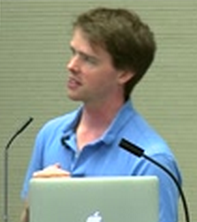Bitesize Modern C++: nullptr--Glennan Carnie
An article about the null value of a pointer:
Bitesize Modern C++: nullptr
by Glennan Carnie
From the article:
What’s the value of a null pointer?
- 0
- NULL
- NUL
No doubt you’ve been involved in the (always heated) discussions about which is the correct one (By the way, if you said NUL you need to take yourself to one side and give yourself a stern talking to)...

 More rapid-fire “now write this using lambdas” problem-solution drill with Sumant Tambe:
More rapid-fire “now write this using lambdas” problem-solution drill with Sumant Tambe: Have you registered for CppCon 2015 in September? Don’t delay –
Have you registered for CppCon 2015 in September? Don’t delay –